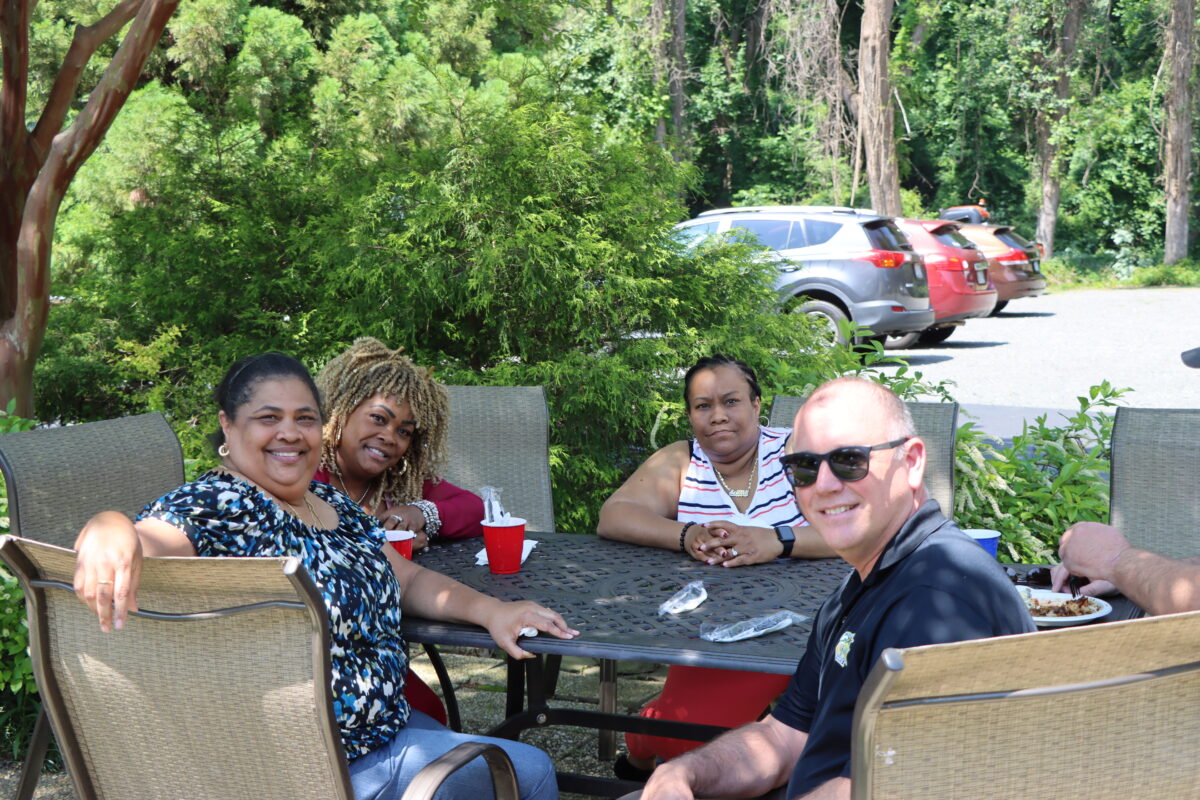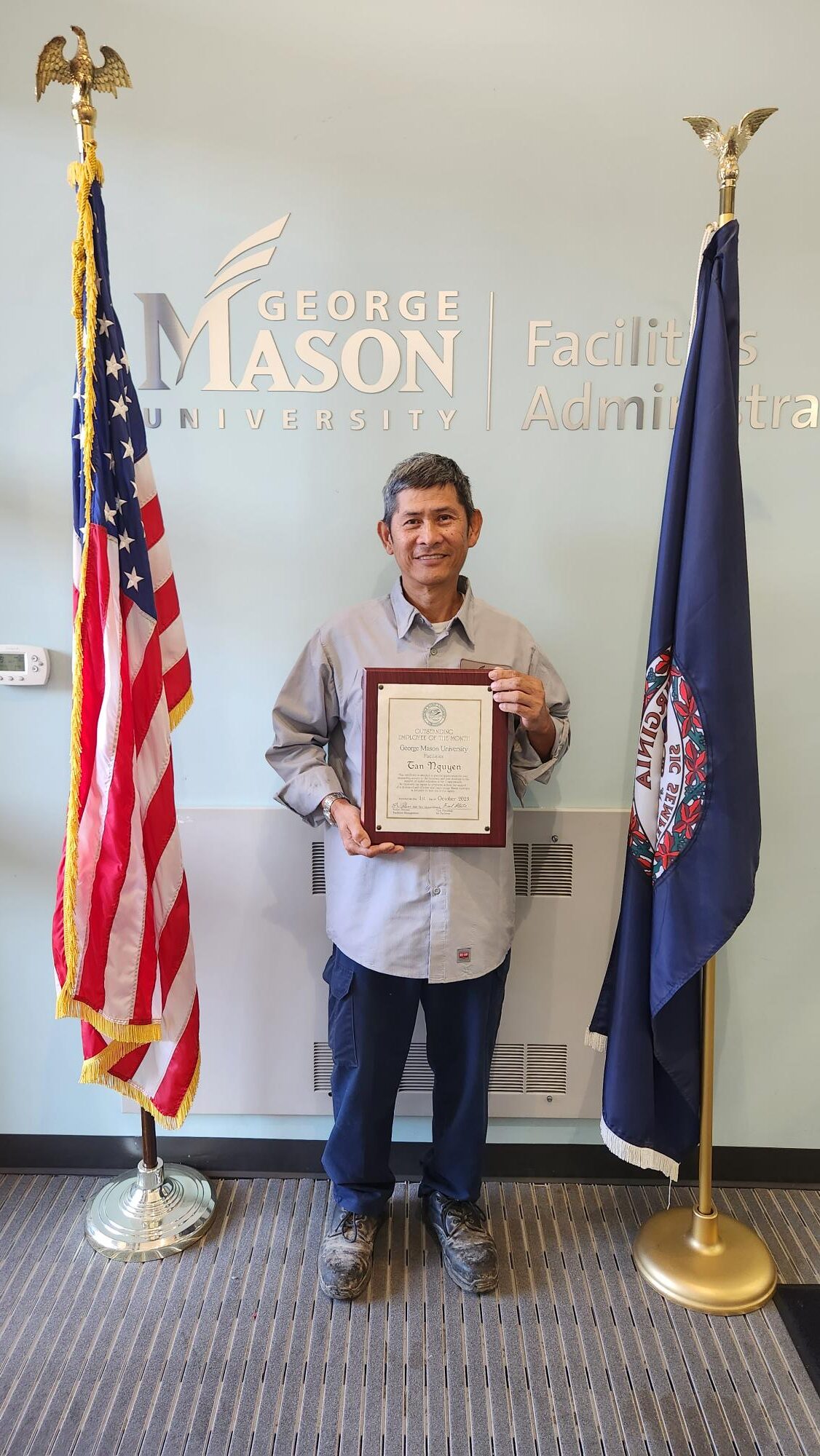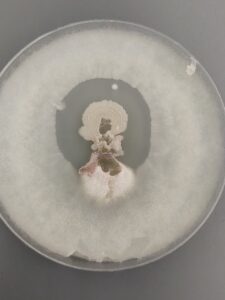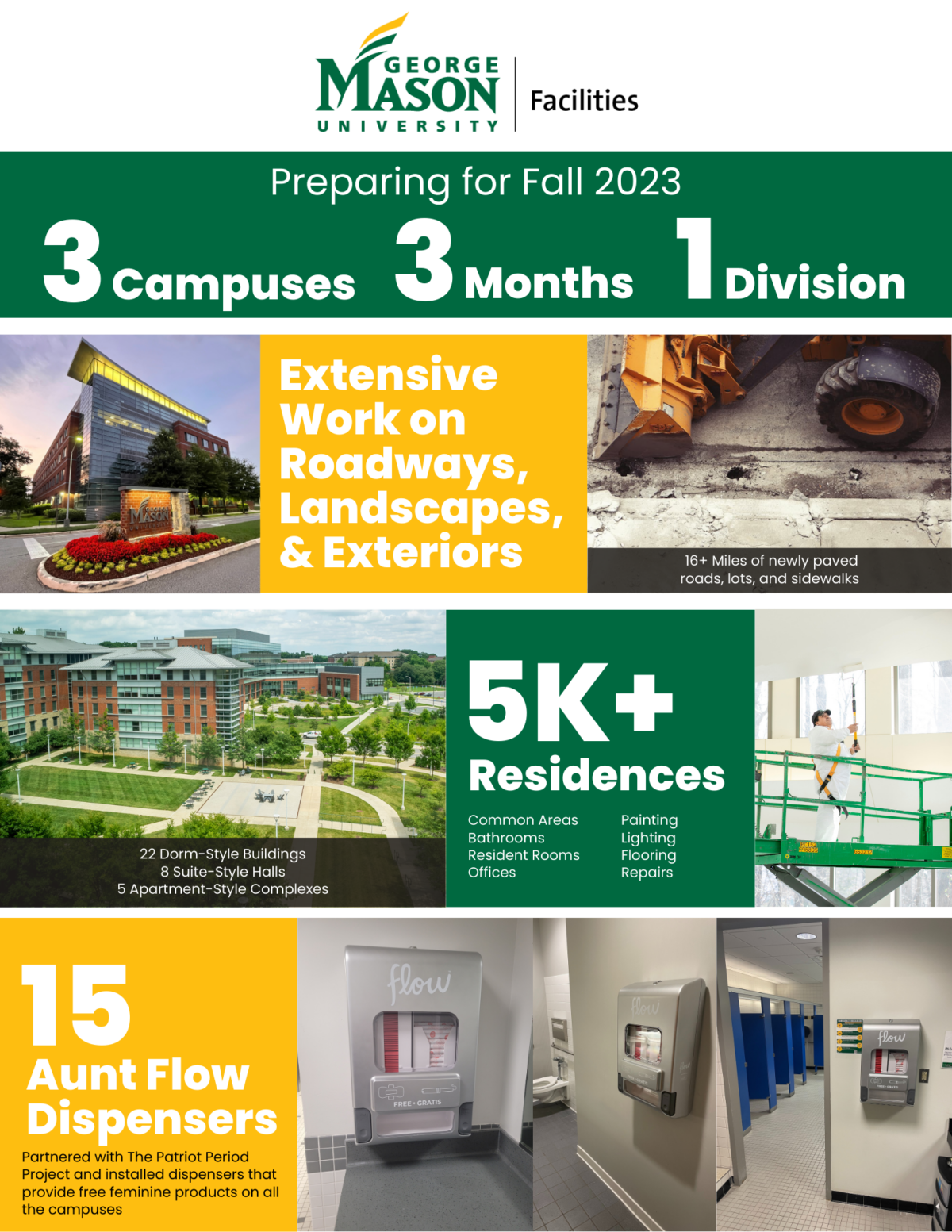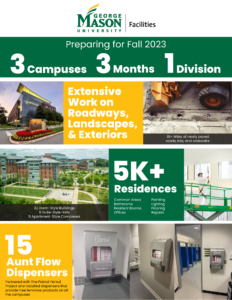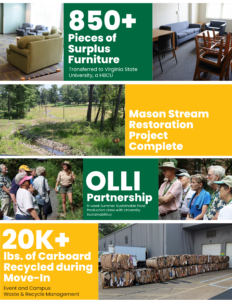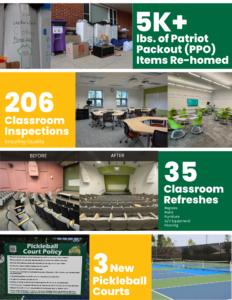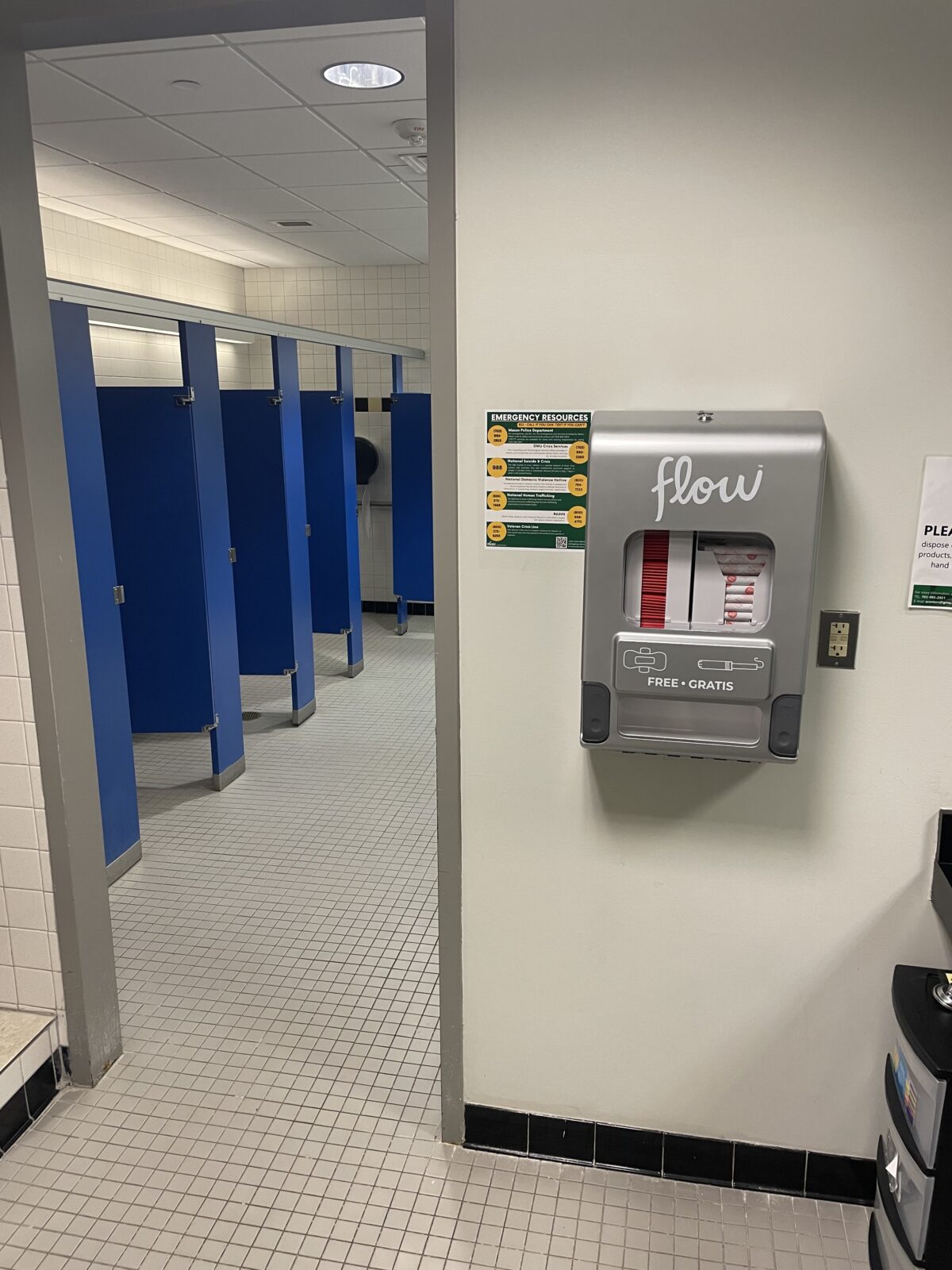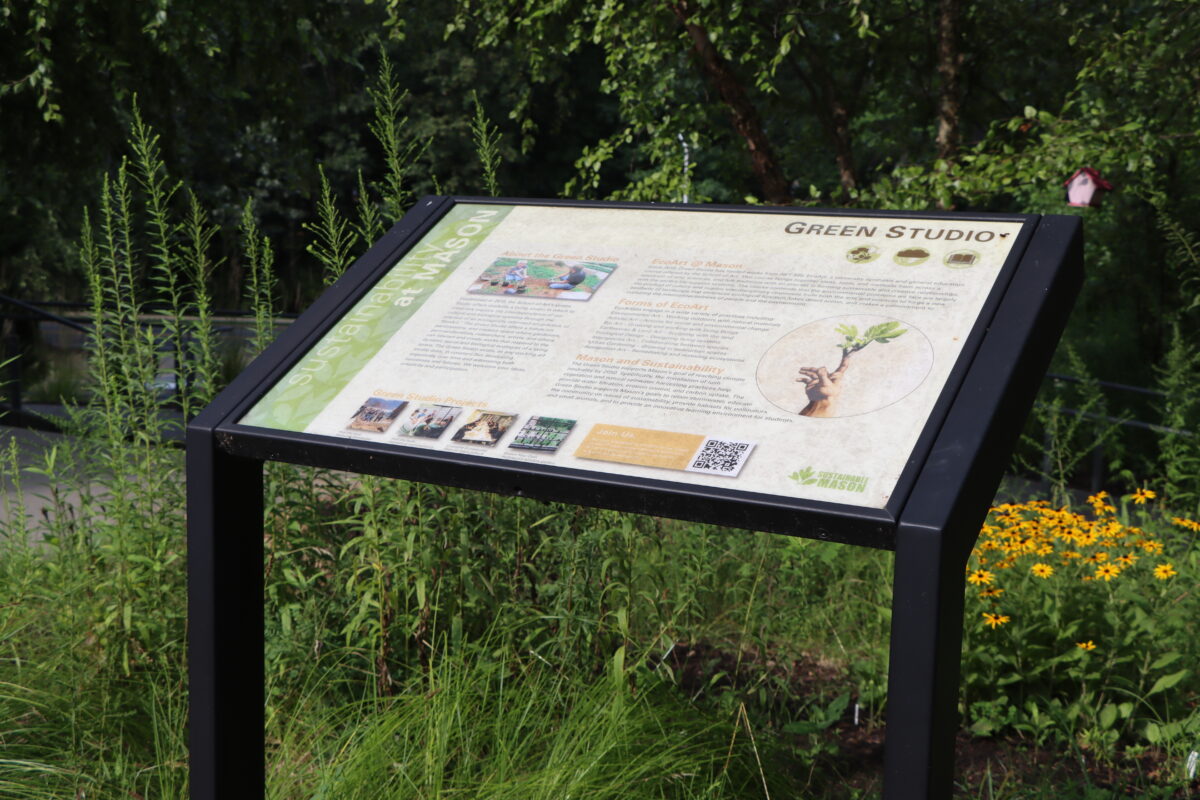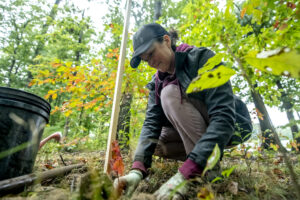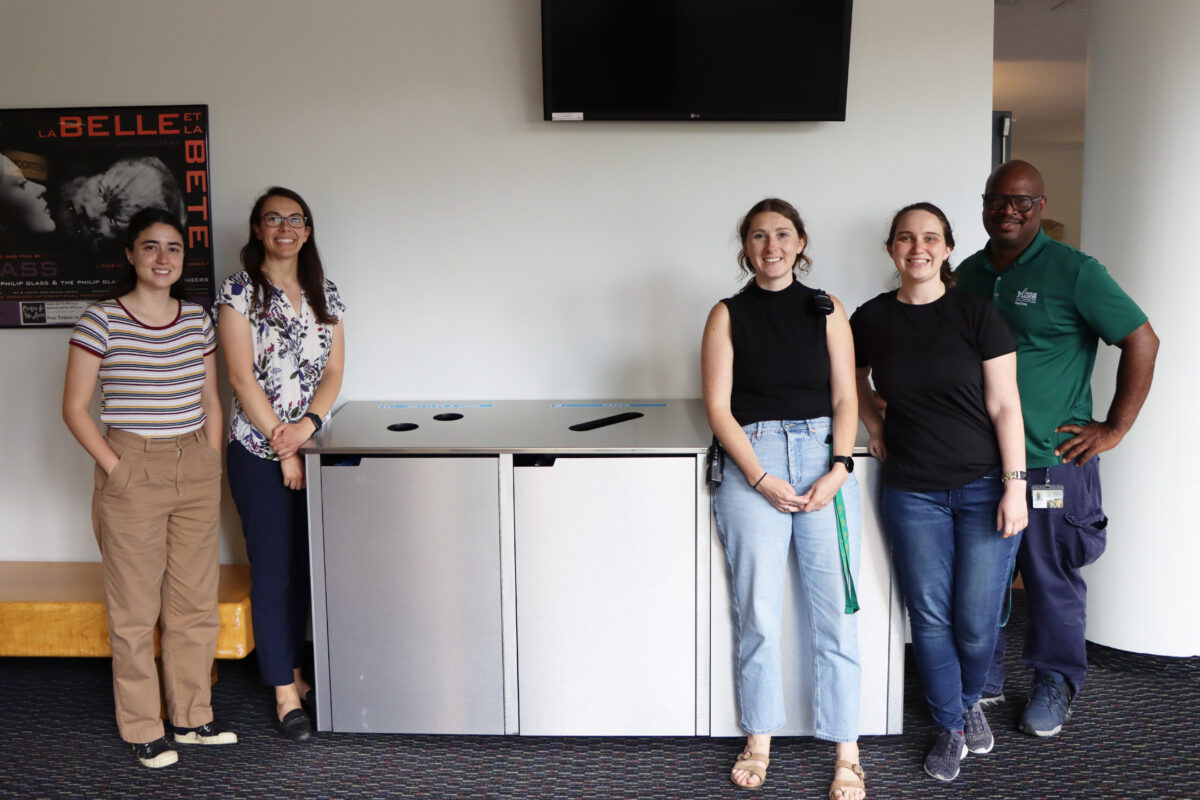Patriot Packout (PPO) 2023, George Mason University's annual end-of-the-year donation initiative, collected and redistributed 5,700 pounds of donations valued at up to $29,614. 4,113 pounds of donations went to individual Mason Patriots and Mason’s on-campus resources, and the remaining 1,587 pounds were redistributed to local community resources. Mason Facilities’ University Sustainability team supported PPO 2023 and the Patriot Packout Planning Committee led the planning, design, and implementation of this year's PPO.
PPO provides on-campus donation resources for all Mason Patriots affected by move-out to divert new, like-new, and gently used items from the trash into the hands of Mason students, faculty, staff, and community members who need them.
PPO first began in 2003 when Mason Facilities staff collected clothing items and transported them to the local Salvation Army. It became a formal initiative in 2010, through a partnership between University Sustainability, Housing and Residence Life, Parking and Transportation, and Facilities Management.
PPO volunteers collect like-new, gently used, and new donations at specific sites on the Fairfax Campus, the Smithsonian-Mason School of Conservation, and the Science and Technology Campus. Acceptable donations include clothing, non-perishable food and hygiene items, books and school supplies, small appliances, electronics, small furniture, and household goods.
In 2023, University Sustainability launched the Patriot Packout Planning Committee to expand PPO’s impact and prioritize the free redistribution of donated goods to Mason Patriots in need. For PPO 2023, the PPO Planning Committee was co-facilitated by Colleen Regan, University Sustainability’s Zero Waste Specialist, and Ben Auger, formerly the Sustainability Engagement Coordinator with University Sustainability. More than twenty Mason community members served on the PPO Planning Committee and worked together to plan, design, and implement this year’s PPO with support from the Mason Facilities’ University Sustainability team and more than 45 volunteers.
Regan emphasized the collaborative nature of PPO 2023, saying that, “This year’s Patriot Packout would not have been possible without the commitment of the PPO Planning Committee and the collaboration of the entire Mason community. We set out to host a PPO event that was more reflective of the needs of Mason students, faculty, and staff across our campuses.”
PPO 2023 occurred from May 5 – May 22 at the Fairfax Campus while being held from May 5 to the end of June at the Science and Technology Campus and Smithsonian-Mason School of Conservation. Donations were collected at four pop-up locations near the residence halls and three 24/7 sites on the Fairfax Campus, in the Beacon Hall lobby on the Science and Technology Campus, and in the lobby of the G.T. Halpin Family Living and Learning Community residence hall on the Smithsonian-Mason School of Conservation Campus.
This year marked the first time the Science and Technology Campus and the Smithsonian-Mason School of Conservation were formally integrated into PPO, led respectively by Michal Galvin, the Associate Director for Regional Campuses with University Life, and by Kristal Miller, Resident Director, and Susie Mueller, SMSC Facilities Admin.
Another first for this year's PPO was the inclusion of two clothing ‘Swap and Hop’ events hosted on May 7 and May 8 by PPO Committee member and current Mason undergraduate student, Mona Hassan. Students swapped their clothes with previously donated clothing they wanted or needed while being encouraged to donate items to PPO.
After donation collections ended on May 22, donated items were transported to the Gillespie Gallery of Art, generously provided by the Mason Exhibitions team as a temporary storage location. All donations were carefully sorted, organized, and inventoried by volunteers for data reporting purposes.
After the process of sorting, organizing, and inventorying was completed, the redistribution of donated items began. Approximately 903 pounds, valued at up to $5,802, of high-need items were redistributed directly to the Patriot Pantry, Trans Clothing Closet, Art Supply Sharing Closet, the First Gen+ Center, Parking and Transportation, INTO Mason, Computing and Engineering Diversity Resource and Information Center (CEDRIC), Mason Innovation Exchange (MIX), and the School of Art’s Painting Studio.
On June 8, 304 pounds of food and unused, personal hygiene supplies (valued at up to $789) were donated to the Patriot Pantry to support Mason Patriots who are experiencing basic needs insecurity. This effort was made possible by Parking and Transportation’s integration of their end-of-semester Patriot Pantry Donation Drive with PPO, and Mason Dining’s partnership with Move for Hunger, who transported donated supplies. Move for Hunger brought another 100 pounds of donated food, hygiene, and emergency supplies (valued at up to $257$) that the Patriot Pantry could not accept to Food For Others, a Fairfax non-profit supporting people in the local community experiencing food insecurity.
On June 26 and June 27, PPO’s first-ever Free Redistribution Event was hosted in the Gillespie Gallery. Thanks to this space, more than 110 Mason students, faculty, and staff attended the event and freely selected from the items donated during PPO. Mason Patriots received 1,815 pounds of items valued at up to $9,795 during this event, including academic supplies, clothing, bedding, household goods, electronics, and more.
Following the Free Redistribution Event, 1,567 pounds of donations, valued at $9,590 that could not be redistributed to Mason Patriots were donated to the following local community resources: Committee for Helping Others, Food For Others, Immanuel’s Hope, Shelter House (Katherine Hanley), Women Giving Back, and the Fairfax County Animal Shelter. Additionally, items from the Science and Technology Campus and Fairfax Campus were donated to three non-profit thrift stores: House of Mercy, AmVets, and Green Drop. Non-perishable food donations collected at SMSC were donated to “Blessings Boxes” and all other items were donated to Page One.
“Last year, less than 600 pounds of useful donations were distributed through on-campus partners, and this year we redistributed over 4,100 pounds of goods and supplies within our campus community – with 82% of that going directly to individual Mason Patriots for free. The greatest success of PPO 2023 was that it demonstrated the positive impacts that Mason students, faculty, and staff can make through our collective efforts,” said Regan.
PPO provides Mason Patriots with items they need through free redistribution, and it educates the Mason community about appropriate waste disposal. The beginning and end of each semester are challenging for the Facilities Housekeeping and Waste and Recycling team members due to the tremendous volume of waste generated. Responsibly sorting and disposing of waste protects Mason workers from harmful exposures, facilitates efficient waste hauling to avoid overflowing bins, and ensures maximum recovery of waste resources by diverting them away from incineration through recycling and composting.
By sorting waste materials and donating usable items, Mason Patriots helped save Mason Facilities and the University $1,414 in avoided waste hauling costs during Spring 2023 move-out. Kevin Brim, Facilities Waste & Recycling Supervisor, said that “As a Mason community, we continue to improve how we process our waste and recycling, which fall under strict rules and regulations. PPO demonstrates how donating usable items, instead of throwing them away, and appropriately disposing of waste is good for people, good for the environment, and good for the university!”
To increase Mason Patriots’ access to donated items, approximately 567 pounds of items donated during PPO, primarily clothing and household goods, were put aside in a storage container provided by Mason Facilities Management for campus redistribution during the academic year. Mason Patriots can freely select any items they need, or swap items with others at the PPO ‘Swap and Hop’ table at Mason Dining’s monthly Farmers’ Markets on the Fairfax Campus.
The upcoming Farmers’ Markets are scheduled from 11 a.m. - 2 p.m. on Wednesday, November 1, at the Wilkins Plaza near Southside Dining Hall and Wednesday, December 6, in the Southside Dining Hall Lobby. This monthly opportunity provides Mason Patriots with increased access to receive items they need or donate items they’re no longer using.
Regan invites all members of the Mason community to participate in Patriot Packout. “Patriot Packout is a community-based initiative, and all Mason Patriots are welcome to join the effort to make PPO 2024 even better!”
Folks participating in the monthly Swap and Hop events and all readers of this article are encouraged to join the Patriot Packout Planning Committee.
PPO 2023 Impact Summary:
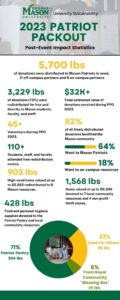
- 5,700 pounds of donations valued at $29,614 were redistributed during Patriot Packout 2023.
- Donations were redistributed directly to Mason Patriots in need as well as 9 on-campus and 11 off-campus partners.
- 88% – 5,016 pounds – of all PPO donations were redistributed for free to individual Mason Patriots, Mason campus resources, and local community resources
- 3,229.24 pounds of donations were redistributed for free and directly to Mason students, faculty, and staff.
- 82% of all freely redistributed donations went directly to individual Mason Patriots in need and Mason on-campus resources
Want to support PPO and help make Mason even more sustainable? Submit your interest form to join the Patriot Packout Planning Committee
Want to get involved? Attend PPO’s Donation Swap and Hops at Mason Dining’s Farmers Markets!
Want to tell us about your experience during PPO 2023? Submit your Patriot Packout 2023 Feedback Form!
Patriot Packout is people-powered and made possible with the support of volunteers, Mason partners, community partners, and the PPO Planning Committee. The Patriot Packout Planning Committee extends gratitude to all Committee members, Mason and non-Mason partners, volunteers, and everyone who donated to PPO.
The authors recognize there are more PPO stories than can fit in a single article and invite folks to share their PPO stories by emailing [email protected].


